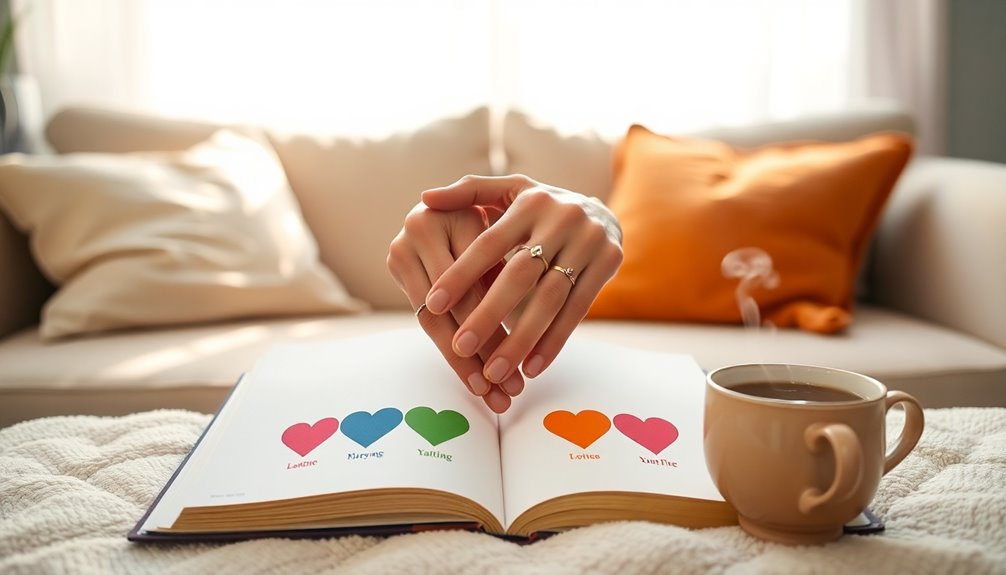Love is a complex emotion that impacts every aspect of your life. It comes in many forms—romantic, platonic, familial, and even self-love. Your early relationships shape how you connect with others, influencing emotional health and communication. Biologically, love triggers joy-inducing chemicals in your brain, making you feel euphoric and bonded. Cultural expressions also play a significant role, as they influence how you perceive and express love in relationships. Understanding these various dimensions can improve your relationships and well-being. Keep exploring to uncover deeper insights and practical ways to cultivate love in your life.
Key Takeaways
- Love is a multifaceted emotion encompassing romantic, platonic, familial, and self-love, influencing overall emotional well-being.
- Psychological insights reveal that understanding love languages enhances communication and relationship satisfaction.
- Attachment theory highlights how early relationships shape adult intimacy and emotional connection abilities.
- Physiological responses, like dopamine release, elevate pleasure and bonding, especially during the initial stages of romantic love.
- Cultivating love through self-love and acts of kindness fosters deeper connections and contributes to societal well-being.
Understanding Love's Definitions

What does love truly mean? Love encompasses a range of emotions, from affection to deep connection, greatly impacting individuals' emotional well-being.
You might recognize various types, like romantic, platonic, familial, and self-love. The ancient Greeks categorized love into four primary forms: Eros, Storge, Philia, and Agape, each reflecting unique aspects of relationships. Additionally, supporting a partner in their journey can enhance the depth of love experienced within a relationship.
Modern psychology breaks love down into three critical components: intimacy, passion, and commitment, which help you understand relationship dynamics better.
Furthermore, love's expression varies across cultures, influencing how you approach and perceive emotional connections.
Biological factors, such as neurotransmitters dopamine and oxytocin, also play a role in how love feels, reinforcing the bonds that enhance your life and relationships. Understanding the importance of communication can further deepen emotional connections and foster healthier relationships.
Psychological Insights on Love

When you think about love, consider how your early relationships shape your emotional connections today.
Understanding your love language and emotional intelligence can greatly enhance your relationship satisfaction and dynamics. Recognizing signs of stagnation in relationships can help you initiate crucial changes for better emotional health. Additionally, reflecting on past mistakes can provide valuable insights into your approach towards love and relationships moving forward. Embracing unconditional love can create a safe environment for vulnerability and personal growth.
Attachment Theory Insights
Understanding how attachment theory shapes our emotional experiences can provide valuable insights into the nature of love and intimacy. The relationships you formed with caregivers influence your ability to connect with others as an adult. Secure attachment fosters healthy, satisfying relationships marked by open communication and emotional support. In contrast, anxious attachment may lead to dependency and fear of abandonment, while avoidant attachment often results in emotional distance. Research shows that emotional regulation plays a crucial role in managing relationship dynamics and fostering resilience in love. Additionally, recognizing how narcissistic behavior can impact attachment styles enhances your understanding of relationship challenges. Individuals with borderline personality disorder often struggle with emotional instability, which can further complicate attachment dynamics in relationships.
Recognizing your attachment style can greatly impact your emotions and relationship dynamics. By understanding these patterns, you can engage in personal growth, fostering stronger, healthier connections. Mindfulness practices can also support emotional regulation, enhancing your ability to form meaningful relationships.
Ultimately, acknowledging your attachment style empowers you to navigate love more effectively, enhancing both your emotional well-being and the quality of your relationships.
Love Languages Impact
How can recognizing your love language transform your relationships? Understanding love languages—words of affirmation, acts of service, receiving gifts, quality time, and physical touch—allows you to communicate effectively and meet emotional needs. This recognition fosters supportive relationships, reducing conflict and enhancing intimacy. Additionally, just as establishing a bedtime routine can benefit infants, having a consistent way to express and receive love can strengthen your bond with partners.
| Love Language | Impact on Relationships |
|---|---|
| Words of Affirmation | Boosts self-esteem and appreciation |
| Acts of Service | Shows care through helpful actions |
| Receiving Gifts | Expresses thoughtfulness and love |
| Quality Time | Strengthens emotional connections |
| Physical Touch | Enhances feelings of closeness |
Emotional Intelligence Role
Emotional intelligence (EI) greatly influences the way we experience love, as it empowers you to recognize and manage your emotions while connecting with your partner's feelings. By fostering empathy and compassion, EI allows you to navigate conflicts and enhance communication, leading to more satisfying relationships. When you understand your partner's emotional needs, you can express love in ways that resonate deeply, utilizing the transformative power of love languages. This skill not only strengthens your bond but also helps you both remain resilient during challenges. Additionally, emotional intelligence is crucial for understanding relationship compatibility, which can significantly enhance your connection with your partner. As you develop emotional intelligence, you'll likely notice improvements in your mental health and overall happiness, making love more fulfilling and enriching than ever. Furthermore, the ability to address recurring dreams related to emotional experiences, such as love and attachment, can also provide insights into your relationship dynamics. Emotional intelligence also plays a vital role in support networks for new fathers, allowing individuals to better navigate the complexities of love and relationships. Additionally, prioritizing self-care in empowerment is crucial as it nurtures your emotional well-being, allowing you to fully engage in a loving relationship.
The Biology of Love

When you experience love, your brain floods with neurotransmitters like dopamine and oxytocin, driving feelings of pleasure and bonding.
These chemical changes not only enhance your emotional well-being but also trigger physiological responses, like changes in heart rate.
Understanding these biological mechanisms helps explain why love feels so powerful and transformative.
Neurotransmitters and Bonding
While love may feel like an intangible mystery, its roots lie deeply embedded in biology, particularly through neurotransmitters like dopamine and oxytocin. These chemicals play essential roles in bonding and emotional connection.
Here are some key points about their impact:
- Dopamine triggers feelings of pleasure and reward, making love feel euphoric.
- Oxytocin, known as the "love hormone," promotes trust and attachment during physical intimacy.
- The release of these neurotransmitters creates a cycle of emotional reinforcement that deepens relationships.
- During the "honeymoon phase," heightened levels of these chemicals intensify attraction and bonding.
Understanding these biological factors can help you appreciate the profound connections formed through love, shaping your experiences and relationships in meaningful ways.
Physiological Responses to Love
Love isn't just an emotional experience; it triggers a variety of physiological responses that reflect its profound impact on our bodies.
When you fall in love, your brain releases neurotransmitters like dopamine and oxytocin, creating feelings of pleasure and deep bonding. You might notice your heart rate increasing and your senses becoming heightened, especially in the early stages of romantic love.
During this "honeymoon phase," you experience elevated euphoria and improved emotional well-being. Love activates brain areas linked to reward, similar to addictive substances, which can enhance your overall happiness.
Plus, being around a loved one can lower your stress levels and boost your immune function, contributing greatly to your physical health.
Cultural Perspectives on Love

Though perceptions of love differ widely across cultures, they profoundly shape how you express and experience affection. Cultural perspectives on love are influenced by societal norms, leading to varied expressions of this complex emotion.
Here are four ways love transcends cultural boundaries:
- Arranged Marriages: Some cultures prioritize familial approval and social compatibility over romantic choice.
- Art and Literature: Diverse ideals of love manifest through themes ranging from passionate romance to deep friendships.
- Celebrations: While Valentine's Day focuses on romantic love in the West, other cultures celebrate love through communal gatherings.
- Globalization: Cross-cultural exchanges enrich personal relationships, broadening your understanding of love's many forms. Additionally, understanding astrological compatibility can enhance perceptions of emotional connections across different cultures.
Love's Impact on Society

Cultural expressions of love provide a rich backdrop for understanding its broader societal effects. The power of love strengthens bonds within communities, fostering social cohesion and creating a sense of belonging. This connection leads to significant impacts like lower crime rates and increased productivity among individuals in healthy relationships. Research shows that strong social bonds contribute to greater longevity and overall happiness, enhancing mental health. Moreover, mastering emotional health can help couples navigate the complexities of love more effectively. In this regard, the development of self-regulation skills is crucial, as they enable individuals to manage emotions and maintain healthy interactions. It is essential for individuals to be aware of the physical effects of narcissistic abuse, as this knowledge can aid in recognizing unhealthy relationship patterns. However, love's complexities, such as heartbreak and jealousy, can challenge this well-being, underscoring the need for emotional support systems. Couples like Clara May and Paul demonstrate the importance of communication as key to navigating relationship complexities, which is essential for maintaining those strong social bonds. Additionally, the empathy and altruism love inspires can drive collective action for social change, encouraging kindness and advocacy for justice. Ultimately, love shapes not just individual lives but the very fabric of society.
Exploring Love at First Sight

What makes that moment so magical when you lock eyes with a stranger and feel an undeniable spark? This phenomenon, often called love at first sight, captivates individuals and impacts their lives profoundly.
The nature of love can unfold rapidly, driven by:
- Instant attraction: You make a judgment within minutes.
- Non-verbal cues: Body language and tone often speak louder than words.
- Physiological response: Your heart races as dopamine floods your brain, creating a euphoric rush.
- Potential for lasting connection: That spark might evolve into a deep emotional bond.
While the intensity can shift, the initial encounter remains a reflection of love's complexity and its powerful impact on our hearts and minds.
The Role of Love in Resilience

When you face life's inevitable challenges, love can be your greatest ally, providing the emotional support needed to build resilience.
Love has the power to act as a buffer against stress, keeping anxiety and depression at bay. Research shows that individuals in loving relationships tend to enjoy better mental health stability, navigating difficulties with confidence. In long-term relationships, addressing issues like emotional coldness can further strengthen bonds and enhance support.
Strong social bonds, whether romantic or platonic, not only enhance your coping mechanisms but also contribute to a longer life. The sense of belonging that love fosters boosts your self-esteem, enabling you to tackle obstacles head-on.
Ultimately, the emotional connection cultivated through love motivates personal growth and perseverance, giving you the strength to overcome adversity with a supportive partner or friend by your side. Additionally, cultivating positive environments through love can significantly enhance your mental health(#) and overall well-being.
Practical Ways to Cultivate Love

Building on the resilience that love can foster, it's important to actively cultivate loving relationships in your life. Love nurtures emotional well-being, and by investing time and effort, you can strengthen these connections.
Here are four practical ways to cultivate love:
- Practice Self-Love: Prioritize your own well-being; it empowers you to express love to others.
- Engage in Acts of Kindness: Small gestures can create a ripple effect, inspiring love within your community.
- Learn Love Languages: Understand how your loved ones prefer to receive love, whether through words or acts of service.
- Seek Professional Help: Therapy can provide tools for emotional growth and navigate complex relationships.
Embrace these strategies for a positive outlook and deeper connections.
Love's Connection to Well-Being

Love plays an essential role in enhancing your overall well-being, as supportive relationships can greatly reduce feelings of depression and anxiety.
The presence of love in your life has a profound impact on your emotional well-being, improving resilience and helping you cope with stress. Research shows that love activates brain areas linked to reward and pleasure, boosting happiness and life satisfaction.
Engaging in loving relationships not only elevates your self-esteem but also fosters a sense of belonging, vital for mental health. By expressing love through acts of kindness and verbal affirmations, you strengthen your connections, enhancing relationship satisfaction and stability.
Ultimately, love shapes your emotional landscape, paving the way for lasting fulfillment and joy.
Frequently Asked Questions
How Is Love a Complex Emotion?
Love's complexity stems from its many forms—romantic, platonic, familial, and self-love—all of which carry unique dynamics.
You'll find that psychological theories, like Sternberg's love triangle, break it down into intimacy, passion, and commitment.
Biological factors, such as dopamine and oxytocin, intensify these feelings, making love feel addictive.
Culturally, love is expressed differently, shaping your experiences and expectations, which adds layers to this powerful emotion that can bring both joy and heartache.
What Is the Complexity of Love?
Love's complexity is like traversing a maze while holding a smartphone; it's intricate and multi-faceted.
You experience different types of love—romantic, platonic, or familial—each with its own dynamics. Factors like intimacy, passion, and commitment intertwine, creating unique emotional landscapes.
Biological elements, along with cultural influences, further shape your understanding and expression of love.
Ultimately, love challenges you, fostering personal growth and resilience amid vulnerability and potential heartbreak.
What Is the Essence of Love Philosophy?
The essence of love in philosophy often revolves around its multifaceted nature.
You'll find that thinkers like Robert Sternberg highlight intimacy, passion, and commitment as key components.
Ancient Greeks categorize love into types—Eros, Storge, Philia, and Agape—each revealing different dimensions of connection.
This complexity showcases love's profound joy and vulnerability, while existentialists argue it offers meaning and purpose in life, shaping your identity and moral compass.
Why Is Love Such an Important Emotion?
Love's the glue that binds us all together.
It's essential because it enhances your emotional well-being, boosts resilience, and helps you cope with stress. When you feel loved, your brain releases feel-good chemicals like dopamine and oxytocin, making you happier.
Love also fosters social connections, creating a sense of belonging. In loving relationships, you often experience lower stress levels and healthier lifestyles, contributing to both your mental and physical health.
Conclusion
In the grand tapestry of life, love weaves the brightest threads, creating vibrant patterns that connect us all. It fuels our spirits, ignites our passions, and helps us rise from the ashes when life gets tough. As you navigate your own journey, remember that love isn't just a feeling—it's a force that shapes your world. Embrace it, nurture it, and watch as it transforms every moment into something extraordinary, turning the mundane into a beautiful symphony.








